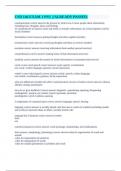CSD 146 EXAM 1 PSU || ALREADY PASSED.
communication correct answers the process by which two or more people share information,
including facts, thoughts, ideas, and feelings
we communicate to express wants and needs, to transfer information, for social etiquette, and for
social closeness
formulation correct answers getting thoughts and ideas together (sender)
transmission correct answers conveying thoughts and ideas to receiver (sender)
reception correct answers receiving information from another person (receiver)
comprehension correct answers making sense of that information (receiver)
modality correct answers the manner in which information is transmitted and received
vocal vs non vocal speech correct answers vocal- speech, vocalizations
non vocal- written language, gestures, facial expressions
verbal vs non verbal speech correct answers verbal- speech, written language
non verbal- vocalizations, gestures, facial expressions
what are additional variables the affect communication success or failure correct answers cultural
identity, setting, participants
how do we give feedback? correct answers linguistic- questioning, agreeing, disagreeing
nonlinguistic- posture, eye contact, facial expression, proximity
paralinguistic- pitch, loudness, pausing
3 components of communication correct answers language, speech, hearing
language correct answers a socially shared code that uses a system of symbols (including sounds
and words) to represent ideas to others, socially shared code
language has 3 domains correct answers content
form
use
content (semantics) correct answers word meanings, relationships, and combinations
form (syntax, morphology, phonology) correct answers rules for organization of words and
sounds
-rules for organization of sentences
-rules for organization of words
-rules for sounds (phonemes) in syllables and words
, use (pragmatics) correct answers -rules for social use of language
using language for different purposes, organizing language for a conversation
speech correct answers the neuromuscular process that allows people to express language vocally
4 components of speech correct answers breath support
voice
articulation
fluency
breath support correct answers "speech breathing"
passive expiration is not enough to support speech
active contraction of inspiratory and expiratory creates a consistent airflow
10% inspiration, 90% expiration
voice (quality, volume, pitch) correct answers the use of vocal folds and breathing to produce
sounds
-how breathy, hoarse, broken, or nasal a voice sounds
-how loud or soft the voice sounds
-how high or low the voice sounds
articulation correct answers how speech sounds are produced- must be accurate and consistent
for effective speech
fluency correct answers rhythm of speech, fluent speech is produced easily, smoothly, without
hesitation, interjection, repetition, or circumlocutions
3 systems involved in speech correct answers respiration, phonation, articulation
respiration system correct answers lungs and trachea
phonation system correct answers vocal folds
articulation system correct answers oral cavity (tongue/teeth), velum (soft palate), jaw
hearing correct answers the perception of sound, or in communication, the perception of speech
sounds
process of acoustics correct answers a sound source creates a set of vibrations
the vibration of air particles create sound waves
(how quickly particles move=frequency, how far particles move=intensity)
ear receives sound waves
brain processes frequency and intensity as pitch and loudness and differentiates speech and non-
speech sounds




